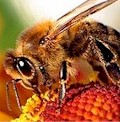Beekeeping is a highly rewarding hobby to undertake, even if you have no plans to benefit from it financially. Most people have no idea when it comes to beekeeping, even if they are experiencing the urge to take it up. No one is born an expert at any subject and the knowledge for your chosen path needs to be learned. This means that a good beekeeping guide is going to be a great investment.
An extensive beekeeping guide is going to help you quickly locate the answers you need to your everyday questions. "How does someone actually get started in beekeeping?" is a prime example. You won't regret acquiring a guide to answer all your questions and one day you'll be thanking yourself! Even experts will look for more information or refer back to a guide for from to time. I know I do. A guide will give you the information required to help you find out whether beekeeping is permitted in the area in which you live. Happily, most areas will permit hobbyists to keep bees where they live. This is because honey bees are docile in nature but if they are not the predominant insect in a given area, then that area becomes free for the taking by wasps or hornets that possess an extremely unfriendly disposition by comparison. Most people would grasp this point and be fairly accommodating of honey bees and their pollination techniques. Where beekeeping supplies can be bought is another likely question for the beginner. This is daunting for some when you are not familiar with what's required, especially for a new business. The local store down the street is not going to have what you need and it's hard to spare some extra time and money with a new supplier. A thorough beekeeping guide though, is going to make it possible to find a list of local manufacturers that other beekeepers have had dealings with previously.
You could already be familiar with the supplies that are needed for beekeeping. You might also be aware of the key elements on how to use them. But beekeeping is not a conventional hobby. For example, a collection of coins or a remote controlled racing car won't leave you with hundreds of painful stings! Bees are living animals and can deliver quite a painful sting. Working with bees has the potential to be very dangerous and someone new to beekeeping should never be "too" enthusiastic when starting out after they have learned the basics. It is vital to possess a good amount of knowledge and be utterly confident of what you are embarking on. Again, a good beekeeping guide will contain this information.
The very point of maintaining a beehive is to enjoy consuming the honey it produces. A fledgling beekeeper is never going to know how to remove honey from the hive, let alone when to remove it, if they haven't first digested the information that is presented in a good quality guide. Making honey is certainly not an exact science. For example, some harvests might yield a very good quantity of honey and other harvests may produce less. If the shed isn't full to the brim with jars of honey, a novice may believe they can re-invent the wheel and fine-tune the process.
While most of the concepts involved with beekeeping focus on common sense, there are aspects where there is no choice but to thoroughly learn them. The absence of an informative guide will not assist the budding beekeeper in accumulating the necessary knowledge to maintain the hive and the colony, and it would be very possible that the hive be lost - along with all its bees.
